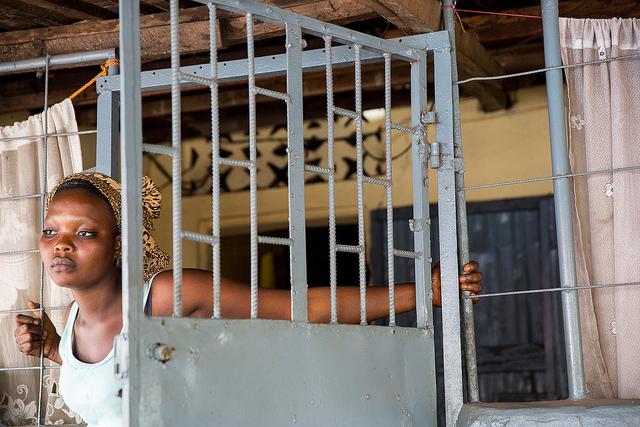Two top officials leading the global Ebola response said today that the small increase in Ebola activity in the outbreak region isn't surprising and that a fresh infusion of cash is needed now to continue funding key response activities such as contact tracing.
Yesterday the World Health Organization (WHO) reported that the number of confirmed cases was slightly up in all three hard-hit countries (Guinea, Liberia, and Sierra Leone) for the first time this year, following weeks of decline, especially in Liberia.
Speaking to reporters at a media briefing in Geneva, David Nabarro, MD, the United Nations' special Ebola representative, said good progress is being made with the response, but, that "The outbreak is not yet under control" and still presents a great threat.
Funds needed ahead of rainy season
The international community has been generous with its donations to the massive response, said Nabarro, but the outbreak is at a crucial phase. Funds are needed now to exploit a 2-month window of opportunity for getting out into communities before the rainy seasons sets in, which is expected to bog down the response and make it difficult to reach rural areas reporting new cases.
Response leaders recently reassessed what they will need to battle the virus from January through June and identified a $1 billion gap. "Please continue that generosity, because the job is absolutely not finished," Nabarro said.
He countered a Feb 3 BMJ report that suggested slow and incomplete international funding has hampered the response. "That's not what I've seen in my six visits to the region," he said, noting that between October and December, $850 million was spent in the region on the response, with about 75% of the UN's request coming through by the end of the year.
Given the outbreak's unprecedented scope, it has been difficult to respond in some places, it's been difficult to find people to help with specific tasks, and officials have had to devise new ways of working, he said.
Virus is on the move again
Bruce Aylward, MD, MPH, the WHO's assistant director-general in charge of Ebola outbreak response, said the uptick in cases reflects the obstacles health officials face in getting new cases down to zero: communities that aren't engaging with responders, financial gaps that prevent responders from quickly adjusting their strategies, and the long-distance movement of the virus. He cited several examples over the past week in which infected people spread the disease from one place, such as Monrovia, to a distant location, even to borders with neighboring countries—events that make transmission challenging to track and pose a threat to wider areas of the region.
"The virus told us loud and clear this week that it's not going away," he said. "This is not what you want to see 2 months before going into the low season as you're running into a cash flow problem with the virus on the move again."
However, with the focus now on finding each case and tracing all contacts, one encouraging development for all three countries is that a growing percentage of new cases are occurring among known contacts; yesterday's WHO report said Liberia is at 100% and Guinea at 54%. Aylward said the latest information for Sierra Leone is that 57% of new Ebola cases are among known contacts.
Those patterns show that epidemiology investments are paying off, but he said funding for those activities is slated to end in February. "That's how precarious we are."
Other developments
- A Doctors without Borders (MSF) official said yesterday in an interview with Reuters that the group focused too much on treatment early in the outbreak and should have emphasized sensitizing the people on how to prevent the disease and the importance of response steps. In an interview with Reuters, Claudia Evers, MSF's Ebola emergency coordinator in Guinea, said the next phase of the response should focus on good hygiene practices and getting people to isolate the sick and bring them in for treatment.
- Early unpublished results of a trial of the Japanese-developed antiviral drug favipiravir suggest some benefits for some people with Ebola, the New York Times reported yesterday, citing an early abstract for a meeting presentation and a Guinea health ministry official who is familiar with the study under way in that country. The drug appears to reduce mortality from 30% to 15% in those with low to moderate Ebola levels in their blood but to have no effect in those with high levels, the group most likely to die from their infections. According to the report, 69 people have received the drug at two sites in Guinea since December. The Times said trial findings will be reported at the end of the month at the Conference on Retroviruses and Opportunistic Infection in Seattle.
- The Presidential Committee for the Study of Bioethical Issues today began a 2-day meeting to discuss considerations and implications of the emergency public health response to the Ebola epidemic. During the group's live webcast today, 15 experts were scheduled to speak on topics that include the ethics of research in the context of a public health emergency, the impact of US public attitudes and policies on affected communities, and historical and sociological perspectives on US policies for preventing the importation and transmission of Ebola. Committee members will deliberate on recommendations for the Ebola response during tomorrow's session.
See also:
Feb 5 WHO press briefing audio file
Feb 4 Reuters story
Feb 4 New York Times story
Jan 29 Bioethics Commission statement
Feb 4 CIDRAP News story "Ebola uptick underscores response challenges"



















